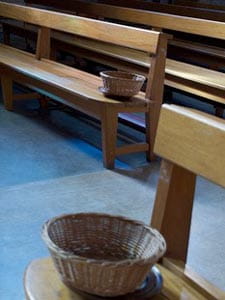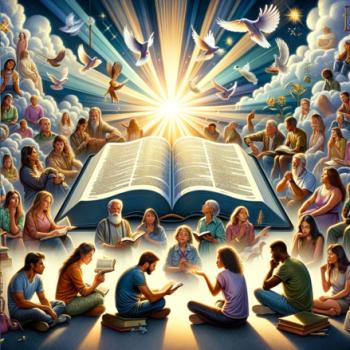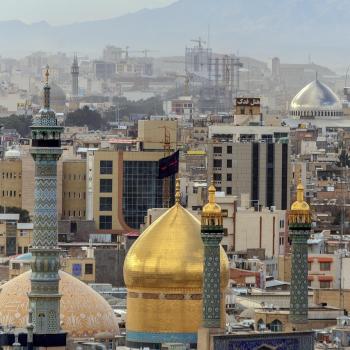By Sandra Lommasson
 One of the most stunning insights of the recently released work by Dr. Alexander Shaia (The Hidden Power of the Gospels: Four Questions, Four Paths, One Journey) is the role of joy in spiritual awakening. Joy carries us beyond our narrow tribalisms into family relationship with one another as beloved children of the One God.
One of the most stunning insights of the recently released work by Dr. Alexander Shaia (The Hidden Power of the Gospels: Four Questions, Four Paths, One Journey) is the role of joy in spiritual awakening. Joy carries us beyond our narrow tribalisms into family relationship with one another as beloved children of the One God.
And yet the energy is not the transformation. Step by step, mistake by mistake, reconciliation by reconciliation, we have to grow up together into our belovedness by growing down into ordinary everyday life. It's like the old wisdom saying, "After ecstasy, the laundry!"
The ancient Christian community knew the significance of tending the laundry on an ongoing basis. Becoming a follower of The Way of Christ was entry into authentic life in a time of unbelievable squalor and oppression -- and yet joining the outlaw community was most likely a death sentence. Long preparation was required for membership, and ongoing tending was essential to creating the courageous communal heart that followed wherever the path led. This community prayed and practiced its life together in a way that opened to a here-and-now experience of the Risen One meeting death with them and overcoming it. The quality of communal life was literally life saving.
A period of communal examination was dedicated annually to taking a long look together at the quality of common life and mission. That period is now called Lent and opens on Ash Wednesday for the six weeks preceding Easter. The retreat is a time for examining together the potency and impacts of joy poured into our unfinished humanness. The same energy that is ‘oil' for the everyday work of becoming the gift we offer to the world is easily co-opted into serving our small selves rather than the living God. When this happens, the community fractures in pettiness and disagreement or settles for making nice. In either direction, vitality hemorrhages and the ‘Living Body' becomes historical memory rather than present reality. Yesterday's news rarely changes lives.
The three traditional aids to examining communal life are in the Sermon on the Mount (Matthew 6): almsgiving, prayer, and fasting. These practices help us notice with freshness our own impact in a community and to name that aloud to others in the community in mutual revelation. Consider engaging an experiment for the next six weeks in which you invite at least one other person in a small faith, work, or family community to join you in reflecting together on what you discover.
Almsgiving
Choose something you want to give yourself to in your relationships or community. Almsgiving is something you do, so choose an act of offering yourself in a tangible way (a listening ear, your loving honesty, your smile, your ability to apologize, a helping hand, a random and anonymous act of kindness a day, etc.) It's meaningful that this discipline comes first, perhaps in recognition that in relationship and community we "act our way into better thinking" rather than think our way into better acting.
Prayer
Ground in prayer. Ask for the willingness to learn about yourself from God's perspective.
Fasting
Balance the giving of yourself (the first practice) with the intentional withdrawal of energy and attention from something else. For this season, choose a habit that seems to affect others in your community. (You might even ask them.) Do you fill your life with busyness? Then fast from having every minute filled. Are you the one with all the answers? Then fast from offering your opinion. Do you withhold what you are thinking and feeling? Then fast from the habitual posture of retreat and experiment with offering more of who you are.
The ash that marks the beginning of this season is one of the most fertile substances on the planet. To be marked with ash is to remember that the journey is never ending and that we continually are called back to beginnings. But each beginning -- though it may feel a death --is rich and fertile. Dr. Shaia writes, "May all in us that need be burnt -- do so. May we set the flame and stoke the fire by our own hands so that at Pentecost our communities may be more fully alive."
 Looking Ahead
Looking Ahead
In the coming weeks, use the structure of the four-part pattern of the movement of Grace embodied in the lectionary cycle. This year the cycle is predominantly in Luke with the fourth-path question of how to mature in service in a world that is indifferent or hostile to the gift one bears. Weeks 3, 4, and 5 revert to the annual scrutinies of the ancient retreat pattern of the church from the Gospel of John and are meditations on the third-path question of how to receive joy in a way that builds rather than breaks community. (See Quadratos.com for more information about the four movements of the pattern.)




